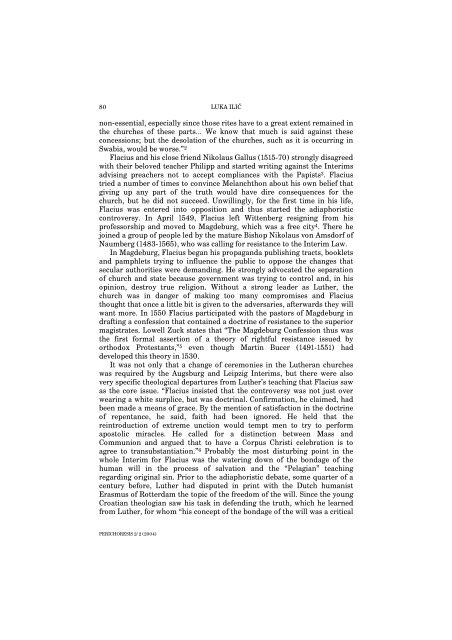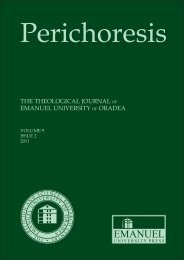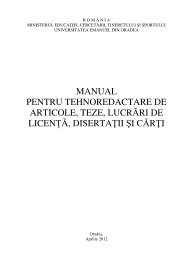Paradise Lost - Universitatea "Emanuel"
Paradise Lost - Universitatea "Emanuel"
Paradise Lost - Universitatea "Emanuel"
You also want an ePaper? Increase the reach of your titles
YUMPU automatically turns print PDFs into web optimized ePapers that Google loves.
80<br />
PERICHORESIS 2/2 (2004)<br />
LUKA ILIĆ<br />
non-essential, especially since those rites have to a great extent remained in<br />
the churches of these parts… We know that much is said against these<br />
concessions; but the desolation of the churches, such as it is occurring in<br />
Swabia, would be worse.” 2<br />
Flacius and his close friend Nikolaus Gallus (1515-70) strongly disagreed<br />
with their beloved teacher Philipp and started writing against the Interims<br />
advising preachers not to accept compliances with the Papists 3 . Flacius<br />
tried a number of times to convince Melanchthon about his own belief that<br />
giving up any part of the truth would have dire consequences for the<br />
church, but he did not succeed. Unwillingly, for the first time in his life,<br />
Flacius was entered into opposition and thus started the adiaphoristic<br />
controversy. In April 1549, Flacius left Wittenberg resigning from his<br />
professorship and moved to Magdeburg, which was a free city 4 . There he<br />
joined a group of people led by the mature Bishop Nikolaus von Amsdorf of<br />
Naumberg (1483-1565), who was calling for resistance to the Interim Law.<br />
In Magdeburg, Flacius began his propaganda publishing tracts, booklets<br />
and pamphlets trying to influence the public to oppose the changes that<br />
secular authorities were demanding. He strongly advocated the separation<br />
of church and state because government was trying to control and, in his<br />
opinion, destroy true religion. Without a strong leader as Luther, the<br />
church was in danger of making too many compromises and Flacius<br />
thought that once a little bit is given to the adversaries, afterwards they will<br />
want more. In 1550 Flacius participated with the pastors of Magdeburg in<br />
drafting a confession that contained a doctrine of resistance to the superior<br />
magistrates. Lowell Zuck states that “The Magdeburg Confession thus was<br />
the first formal assertion of a theory of rightful resistance issued by<br />
orthodox Protestants,” 5 even though Martin Bucer (1491-1551) had<br />
developed this theory in 1530.<br />
It was not only that a change of ceremonies in the Lutheran churches<br />
was required by the Augsburg and Leipzig Interims, but there were also<br />
very specific theological departures from Luther’s teaching that Flacius saw<br />
as the core issue. “Flacius insisted that the controversy was not just over<br />
wearing a white surplice, but was doctrinal. Confirmation, he claimed, had<br />
been made a means of grace. By the mention of satisfaction in the doctrine<br />
of repentance, he said, faith had been ignored. He held that the<br />
reintroduction of extreme unction would tempt men to try to perform<br />
apostolic miracles. He called for a distinction between Mass and<br />
Communion and argued that to have a Corpus Christi celebration is to<br />
agree to transubstantiation.” 6 Probably the most disturbing point in the<br />
whole Interim for Flacius was the watering down of the bondage of the<br />
human will in the process of salvation and the “Pelagian” teaching<br />
regarding original sin. Prior to the adiaphoristic debate, some quarter of a<br />
century before, Luther had disputed in print with the Dutch humanist<br />
Erasmus of Rotterdam the topic of the freedom of the will. Since the young<br />
Croatian theologian saw his task in defending the truth, which he learned<br />
from Luther, for whom “his concept of the bondage of the will was a critical




